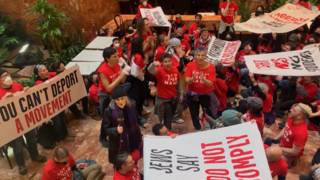
Guests
- John Giblerindependent journalist and Global Exchange human rights fellow, reporting from Oaxaca.
Teachers, activists and local residents in Oaxaca, Mexico, are preparing to march today to mark the first anniversary of a bloody crackdown on striking school teachers that sparked last year’s popular uprising. We get a report from independent journalist and Global Exchange Human Rights Fellow John Gibler.
Transcript
AMY GOODMAN: And in Oaxaca, Mexico, teachers, activists and local residents are preparing to march today to mark the first anniversary of the bloody crackdown on striking school teachers that sparked last year’s popular uprising. For more from Oaxaca, we’re joined by independent journalist and Global Exchange human rights fellow, John Gibler. He’s on the ground in Oaxaca. Tell us what’s happening, John.
JOHN GIBLER: Good morning. At 4:00 a.m. this morning, exactly a year after Oaxaca State Governor Ulises Ruiz sent over a thousand riot police to violently lift the protest camp of striking teachers in the center of the city, members of the Oaxaca People’s Popular Assembly, or APPO, set off bottle rockets across the city, using the protesters’ famous hand-made alarm system to commemorate the one-year anniversary of the police raid, that then set off a six-month unarmed uprising. After parapolice death squads killed over 16 protesters and the New York Indymedia journalist Brad Will in late October last year, then-President Fox ordered federal police to take over control of the city. And though massive protests continued, a clash with the police on November 25th of last year led to a massive crackdown, arrests of over 100 people. In the weeks and months that followed, parapolice groups continued to arrest and torture movement participants. Only a month ago, police grabbed David Venegas, an APPO activist and council member, off the street, first accusing him of selling drugs and, only later, of burning buildings during the clash with police on November 15th—or, 25th.
The APPO has continued to organize, first in clandestine meetings and later in public assemblies and marches. Today, the APPO has convoked a megamarch to march from the airport into the Zocalo, the first time that the APPO will arrive into the Zocalo since last October. They also have called to construct barricades in all of the places in the city where protesters fell to the armed attacks of parapolice groups. The APPO continues to push its main demands: the ousting of Ulises Ruiz and a call for profound social and political transformation of the state. Still, the climate of impunity and repression continues. There are over 300 arrest warrants currently active against movement participants, and no police officers have been either investigated or punished in the more than 20 deaths that occurred last year. Also, just two days ago, the Mexican Supreme Court announced that they would investigate declarations and findings of massive human rights violations in Oaxaca.
AMY GOODMAN: John Gibler is Global Exchange human rights fellow in Oaxaca, reporting from there on this first anniversary. This is Democracy Now!, democracynow.org, The War and Peace Report. I’m Amy Goodman.











Media Options